- Details
-
Category: Commerce Group
-
Published: Saturday, 05 January 2013 11:29
The state of Wisconsin’s mining legislation is some of the strongest in the country and the world. Their “prove it first” law requires mining companies to show that mining in metallic sulfides has been done safely elsewhere in North America, and since no mining company has been able to prove such a project exists, there have not been any mining projects approved in Wisconsin.
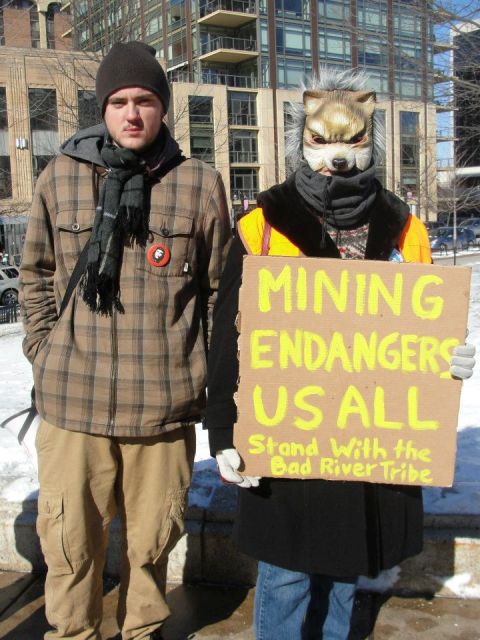 However, now, that legislation is under attack by WI Governor Scott Walker, supported by mining company representatives. Environmental, Indian, and community organizations from across the state are organizing and fighting back to keep the regulations that have protect their water and cultural identity.
However, now, that legislation is under attack by WI Governor Scott Walker, supported by mining company representatives. Environmental, Indian, and community organizations from across the state are organizing and fighting back to keep the regulations that have protect their water and cultural identity.
Now they need your support. Below is a call for support from the Wisconsin Resource Protection Council and the Sierra Club-John Muir Chapter.
For more information on: the WI Mining Moratorium Law, Strip Mine Legislation, the Iron Mining Industry’s Environmental Track Record, and recent press coverage of the issue.
See the full text of the letter here.
Dear Environmental and Conservation Colleagues,
We're writing to ask you to consider signing your organization on to the sign-on letter (below) that will be sent to Wisconsin legislators in both houses by mid-January. The letter asks the legislators to reject special interest legislation gutting Wisconsin mining law to enable a single destructive iron ore mine. Similar legislation was defeated by a single vote in 2012. It also asks the legislators to protect Wisconsin's Mining Moratorium law that simply requires a mining permit applicant to prove that mining in metallic sulfides has been done safely elsewhere in North America. We wish to communicate this message as early as possible in the new session to both new and returning lawmakers for their education.
We request that you let us know by January 11, 2013 if your organization can sign on to this letter. Many of you took strong stands in favor of the Moratorium and against AB 426 (the ferrous or iron mining bill) in the past and we hope you will reaffirm these positions via this letter. Note that nothing you do via this effort limits anything you may wish to do as an organization to fight iron mining legislation or defend the Moratorium; in fact, we hope that you will wish to continue and increase your independent efforts in the new legislative session.
The letter will be delivered to legislators soon after the deadline and will be accompanied by the three companion briefing papers about the Mining Moratorium Law, proposed Iron Mining legislation and the Environmental Track Record of Taconite (Iron) mining. The briefing papers will also be posted to the Sierra Club's website at: http://wisconsin.sierraclub.org/PenokeeMine.asp. Please feel free to post them to your website as a resource for more information or for your own education. You can also learn more by going to Wisconsin Resources Protection Council's site at: www.wrpc.net.
If your organization can sign on the letter, please reply by January 11, 2013 with your organization's name, address and the name and title of the contact person for your group. Please contact Elizabeth Ward at the Sierra Club - John Muir Chapter office at 608-256-0565 or elizabeth.ward@sierraclub.org with any questions or concerns.
Thank you!
Al Gedicks
Executive Secretary
Wisconsin Resources Protection Council
Dave Blouin
Mining Committee Chair,
Sierra Club - John Muir Chapter
Co-founder and Board Member: Mining Impact Coalition of Wisconsin and thePenokee Hills Education Project
See the full text of the letter here.
- Details
-
Category: Commerce Group
-
Published: Wednesday, 21 November 2012 16:48
Concerned Citizens from Across the U.S. Call on a Milwaukee Company to Act Ethically
A Milwaukee Company’s Toxic Legacy
In 2006, the Salvadoran government decided to revoke the failed Milwaukee-based mining corporation Commerce Group’s mining permits following evidence that the mining project had contaminated local water with highly toxic metals. After decades of gold mining, the Commerce Group mine site has been called an “environmental nightmare.”
In 2012, the Salvadoran Ministry of the Environment (MARN in Spanish) found that the river flowing by the Commerce Group mine site has nine times the healthy limit of cyanide and one thousand times the Salvadoran standard for lead in water for human consumption. Local residents are forced to buy water and collect rain water in order to meet their basic needs, and there reports that show severe health problems in the community resulting from exposure to heavy metals.
Recently, Jim Kuipers, an engineer who consulted for Commerce Group in El Salvador in the 1990’s, released a shocking statement claiming Commerce Group bribed local officials in order to get around environmental regulations. Also, in October, the MARN announced it is beginning to investigate the sources of contamination in San Sebastian. According an article published in the Salvadoran press, the Vice-Minister for the MARN said the mining operations carried out by Commerce Group will be subject to investigation.
In 2009, the Commerce Group, filed a $100 million lawsuit in retaliation against the government of El Salvador under the foreign investor “protections” contained in the Central America Free Trade Agreement (CAFTA). The Commerce Group demanded payment not only for its investments, but also the right to reopen the mine against the government’s wishes. On March 14, 2011, Commerce Group lost their case. However, the government was still forced to pay $800,000 to cover the tribunal’s costs in addition to their own legal fees.
Unsatisfied with the decision, Commerce Group filed for an annulment of the decision, but later claimed they had difficulty paying the $150,000 in tribunal fees. It seemed the case would be thrown out due to lack of payment, but on the final day before their case was closed, the company scrapped the fee together. The annulment hearing is expected for sometime in January.
In a recent tour to the United States members of the National Roundtable against Metallic Mining and Caritas talked about the effects of mining and the Commerce Group’s actions in Cleveland, St. Louis, Milwaukee, Madison, Eau Claire, Chicago, Washington D.C. and Georgia. They also circulated a petition (below) that is being promoted by faith-based organizations from across the U.S. that asks the Commerce Group to drop its multi-million dollar suit and take the steps necessary for environmental cleanup in the community of San Sebastian. A Spanish version of the letter is here.
Sign the Petition Here
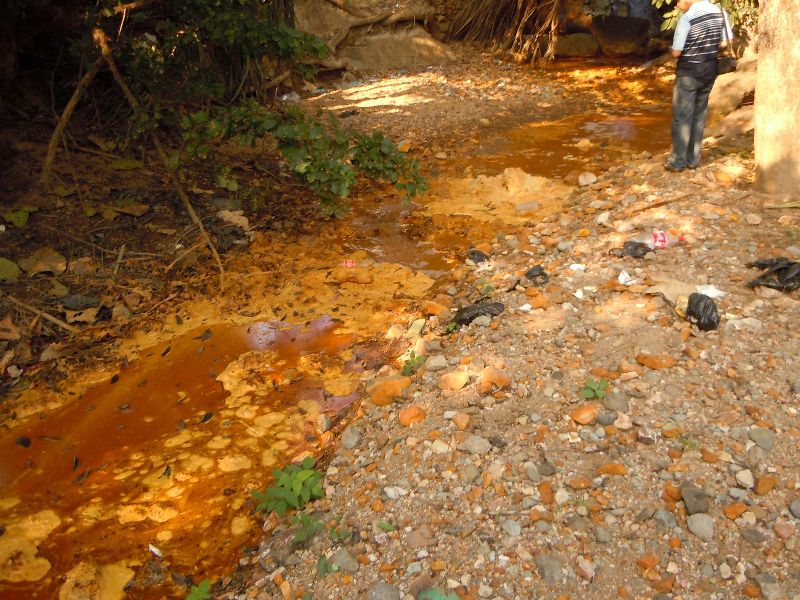
For all people of faith, our primary commitment is to love one another as God loves us. That principle applies to our business dealings, as thoroughly as to other aspects in our lives. In other words: There is no sphere of life excluded from moral scrutiny and the economic sphere is no exception.
We, the undersigned people of faith, implore the Milwaukee-based Commerce Group to weigh the ethical and environmental consequences of pursuing further mining in San Sebastian, El Salvador, to take responsibility for the environmental contamination and to drop its case in the International Centre for the Settlement of Investment Disputes against the Salvadoran government under the Central American Free Trade Agreement (CAFTA).
Trade itself may violate the dignity of others, or, it may protect the dignity of all human beings, thus becoming an “instrument for good,” as Norwegian theologian Atle Sommerfeldt teaches. It may generate wealth for a few, or, create responsible work for many while still protecting the earth.
We urge you to do the latter.
More than a hundred years of mining at the San Sebastian gold mine in El Salvador reportedly resulted in severe environmental contamination and public health problems in the surrounding community and in nearby watersheds. In 2012, confirming investigations and complaints made by civil society, the Salvadoran Ministry of the Environment found that the San Sebastian River had nine times the acceptable limit of cyanide and one thousand times the compulsory standard for water for human consumption of iron. Local environmental organizations attribute this contamination to acid mine drainage leeching from mining waste and it is currently under investigation by the Salvadoran government.
As a result of two separate environmental audits, the Salvadoran government revoked the Commerce Group’s mining permit on Sept. 13, 2006. Now, taking advantage of “foreign investor protections” in CAFTA, the U.S. company Commerce Group is suing the Salvadoran government for $100 million. The tribunal hearing the case ruled in favor of the Salvadoran government in March, 2011, yet Commerce Group has filed for an annulment of that decision.
Communities of faith are deeply concerned about the impact of metallic mining on public health and on the environment, as well as on the escalating number of transnational corporations turning to international arbitration tribunals to resolve disputes over resource rights.
In 2007, the Episcopal Conference of El Salvador stated that “[…] we affirm that, by putting human life in danger, even though there might be economic benefits, precious metal mining should not be allowed in El Salvador. There are no material benefits that may be bought with the value of a human life.” Further, Roman Catholic and Lutheran churches, as well as faith-based organizations, in El Salvador recently issued a statement saying that the “voracity of national and transnational corporations in order to establish environmentally devastating projects, makes us extremely vulnerable to Climate Change.”
The signatures below call on the Commerce Group to take immediate steps to rectify the existing contamination in San Sebastian and to drop its case against the Salvadoran government. Decisions made to increase short-term profits will have long-term consequences for the lives of very vulnerable people.
Signed,
- Details
-
Category: Mining and Human Rights
-
Published: Monday, 19 November 2012 16:48
Salvadoran Indigenous leader Shandur Kuátzin Makwilkali
BY ROBIN LLEWELLYN • NOV 6, 2012
"This is not Cabañas," said Shandur Kuátzin Makwilkali, gesturing around the room and out the window at the wooded slope, but meaning the entire region of that name. He had been describing the growth of indigenous associations throughout this mainly rural department in northern El Salvador, adding:
"Guakotekti is its true name, not the militarily imposed name of Cabañas. Guakotekti is its good name."
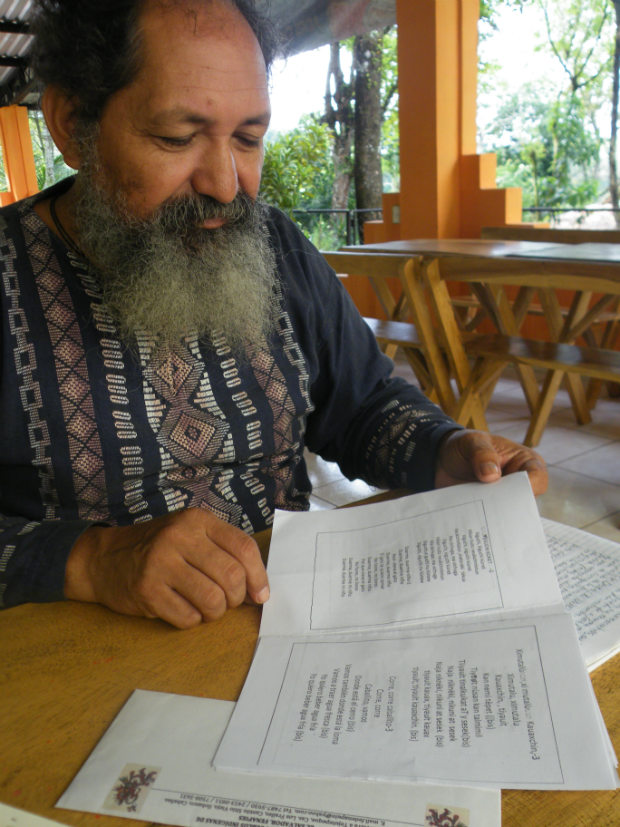 Shandur is President of the National Federation of Indigenous Peoples of El Salvador, which works to resuscitate the vitality of indigenous cultures in a part of Central America where they have been systematically and brutally suppressed. The challenge is significant:
Shandur is President of the National Federation of Indigenous Peoples of El Salvador, which works to resuscitate the vitality of indigenous cultures in a part of Central America where they have been systematically and brutally suppressed. The challenge is significant:
"We don't have enough unity, solidarity", he laments, before returning to the positive: "But now we have a federation, present in 14 departments, with 10,000 members."
The Federation celebrated its first anniversary on 21 January this year. In addition to its remarkable growth, the indigenous movement has established a small University of the Indigenous Peoples of El Salvador, teaching four courses lasting for three and four years. Students can study courses in indigenous medicine, the Nahuat language, indigenous administration, and biculturalism.
Another development is the Cooperative Association of Savings, Credit, Consumption, Housing and Farming of the Nahuat-Pipil Nation. The Federation, University, and Cooperative make up the three branches of the movement that seek to mobilize, educate, and overcome the economic poverty of the indigenous communities.
According to Shandur an unequal distribution of land ownership limits how much can be accomplished in raising living standards, and the Government has been unwilling to engage in negotiations on the question of returning indigenous land.
"Our philosophy as indigenous peoples is to have our land, as she is our mother", Shandur says. "We need to have our land, to have our fruit, rather than money."
Read the rest of the article here….

- Details
-
Category: Pacific Rim/OceanaGold
-
Published: Monday, 19 November 2012 15:37
“What is Happening to Canada’s Good Name?”
As Pacific Rim pushes forward with its law suit for $77 million against the Salvadoran government, environmental, policy and trade organizations visited the Canadian Embassy in Washington on November 12th to talk about the threats posed by Canadian companies in El Salvador. According to a letter addressed to the Canadian Ambassador, the goal of the visit was to “urge the Canadian government to alert Pacific Rim that its investor-state claim against the Salvadoran government for enforcing its own environmental laws and striving to protect its water and communities tarnishes the image of the Canadian mining industry.”
The full text of the letter is available here. The Spanish version is available here.

For more information about the letter and the meeting in the Embassy see:
Harper’s folly is El Salvador’s tragedy: Friends of the Earth visits the Canadian Embassy to protest Pac Rim gold mine fiasco
By Bill Warren
On Monday the 12th of November, I joined representatives of several environmental and public interest groups gathered in front of the grandiose and distinctly odd Canadian Embassy, which occupies one of the most prominent sites in D.C. on Pennsylvania Avenue, just down the hill from the Capitol and across the street from the National Gallery of Art.
Our mission could not be more serious. We came to the embassy to protest the activities of the Vancouver-based Pacific Rim Mining Corporation in El Salvador. Pac Rim’s proposed gold mine threatens the water supply and health of the Salvadoran people and has, inadvertently or not, unleashed violence and murder against opponents of the mining project. This is beyond question a tragedy-- one which has been compounded by Pac Rim’s suit before a World Bank tribunal, where it is demanding tens of millions of dollars in compensation for El Salvador’s alleged violation of its “property rights” under international investment law, after the government denied the company a permit to proceed with its gold mining project.
Read more here…
An Appeal to Canada to Stand with El Salvador, the First Nation to Halt Gold Mining
By Manuel Perez Rocha
Representatives from IPS and other environmental and public policy organizations hold meeting at Canadian Embassy to say, "Tell Pacific Rim to stop bullying El Salvador."
I paid a visit this week to the Canadian Embassy with colleagues from the Institute for Policy Studies and other environmental and public policy organizations to deliver a letter to the Canadian Ambassador to the United States. We are demanding that his government tell Pacific Rim — the Vancouver-based mining company — to stop bullying the people of El Salvador.
Our letter was co-signed by Greenpeace, Sierra Club, Public Citizen, Friends of the Earth, Earthworks, the Center for International Environmental Law, and others. We wrote:
“Given the severe environment and human rights implications associated with Pacific Rim’s investment in El Salvador and the gold mine and cyanide leach-water processing plant it is proposing, we urge the Canadian government to alert Pacific Rim that its investor-state claim against the Salvadoran government for enforcing its own environmental laws and striving to protect its water and communities tarnishes the image of the Canadian mining industry.”
Read more here…
We Stand with the People of El Salvador
By Hillary Lewis
Yesterday I helped deliver a letter to the Canadian Embassy here in Washington, DC, about the lawsuit against the Central American country of El Salvador, by Pacific Rim Mining Corporation. The letter was coordinated by the Institute for Policy Studies and signed by Friends of the Earth, Center for International Environmental Law, Public Citizen, Sierra Club Greenpeace, Earth Island Institute and Foundation Earth (along with Earthworks).
Pacific Rim is a Canadian mining company exploring for gold in the mineral rich mountains of El Salvador. It is no surprise to geologists that Pacific Rim believes they can strike it rich there. Billions of dollars rich.
Read more here…
Radio interview with Manuel Perez Rocha (in Spanish)
Según organizaciones medioambientales, la canadiense Pacific Rim Mining Corp. es una amenaza para El Salvador
Este lunes en Washington nueve organizaciones de defensa del medioambiente presentaron al embajador canadiense en Estados Unidos, Gary Doer, una carta en la que expresan su preocupación por las acciones de la minera canadiense Pacific Rim Mining Corp. en El Salvador. Manuel Pérez Rocha, investigador asociado en el Instituto para el Estudio de Políticas en la capital estadounidense, explica que esta empresa está afectando negativamente la ya erosionada imagen de las mineras canadiense en América Latina.
Listen to the interview here…
- Details
-
Category: Pacific Rim/OceanaGold
-
Published: Wednesday, 31 October 2012 11:22
Communities from Across the Hemisphere Speak out Against Pacific Rim
On October 20th, thousands of people marched in Cabañas, El Salvador to voice their opposition to the proposed gold mining project of Pacific Rim, a Canadian mining company. The anti-mining movement in El Salvador has been growing over the past decade and in 2007, under pressure from this movement, the Salvadoran government began to put restrictions on the burgeoning, foreign-dominated mining industry.
In response, Pacific Rim and Commerce Group, a Milwaukee based mining company, filed multi-million dollar lawsuits against the financially struggling Salvadoran government. The two lawsuits, which total almost $200 million and are being tried at a World Bank trade tribunal, allege that the companies’ free trade agreement protected investment rights have been violated. After months of silence, the tribunal hearing the cases ruled in June of 2012 that Pacific Rim could continue to pursue their claims at the tribunal by taking advantage of domestic Salvadoran investment law.
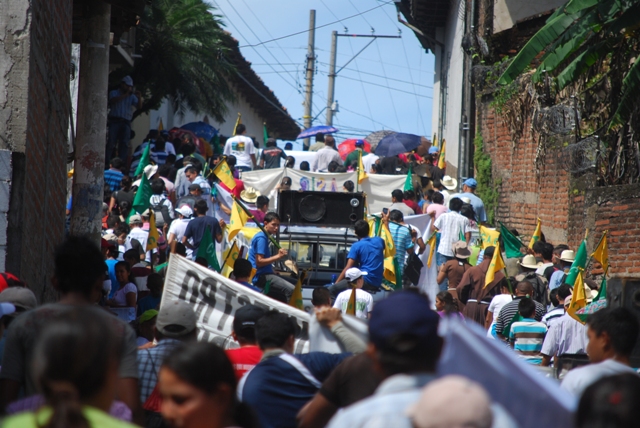
To amplify the demands of the anti-mining movement and its October 20th march in Cabañas, the department where Pacific Rim wants to mine, more than a hundred supporters from around the world called and emailed Pacific Rim. The community members and organizations that participated in the march and their international supporters demand that Pacific Rim respect the decision of the Salvadoran government and it’s citizenry to reject mining. They ask Pacific Rim to drop the lawsuit against the Salvadoran Government and leave El Salvador.
In addition to the calls and emails made to the Pacific Rim headquarters, organizations from across the hemisphere sent statements of solidarity and greetings to El Salvador. Organizations and individuals in Panama, Washington D.C., and Vancouver wrote to show their commitment to supporting the struggle to stop mining. The Mining Justice Alliance from Vancouver wrote, “We are working to change this, and in the upcoming year we will be bringing the harms that Pacific Rim causes to the attention of people in Vancouver in public ways.” The Environmental Advocacy Center in Panama stated their solidarity in a letter to the Mesa: “We congratulate the work of the NATIONAL ROUNTABLE AGAINST METALLIC MINING IN EL SALVADOR in continuing the efforts to stop the development of the El Dorado gold mine, in the Department of Cabañas, because as the slogan in our campaigns say “Panamá is worth more without Mining,” so “El Salvador is worth more without Mining.”
What became clear after October 20th, is that resistance to Pacific Rim’s projects is growing and as people marching in Cabañas said on the 20th “The People United will never be Defeated.”
For pictures from the march…
For the Mesa’s report of the march in Spanish…
For the Solidarity Statementsfrom Panama and Vancouver…
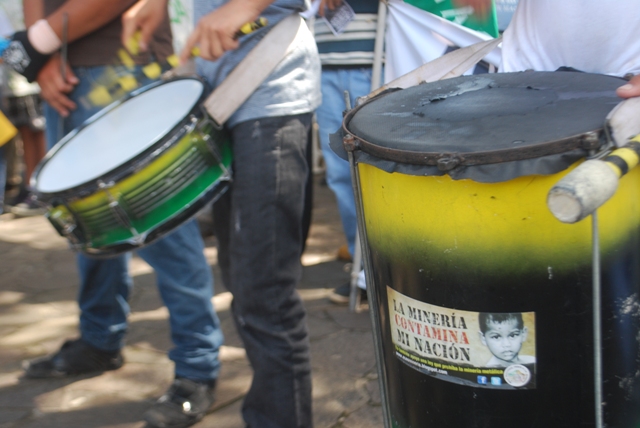
- Details
-
Category: Mining prohibition El Salvador
-
Published: Friday, 26 October 2012 10:33
On June 1st, the International Centre for the Settlement of Investment Disputes (ICSID) ruled that Canadian mining company Pacific Rim would be allowed to continue its $77 million lawsuit against the Salvadoran government by basing its claims in domestic investment law.
Yesterday, the National Roundtable against Metallic Mining (the Mesa) mobilized over a hundred people to support their urgent demand to reform said law. Theypresented a request to the Legislative Assembly detailing a reform that would ensure that corporations are no longer afforded the option of suing the government in the ICSID, before filing claims in domestic courts.
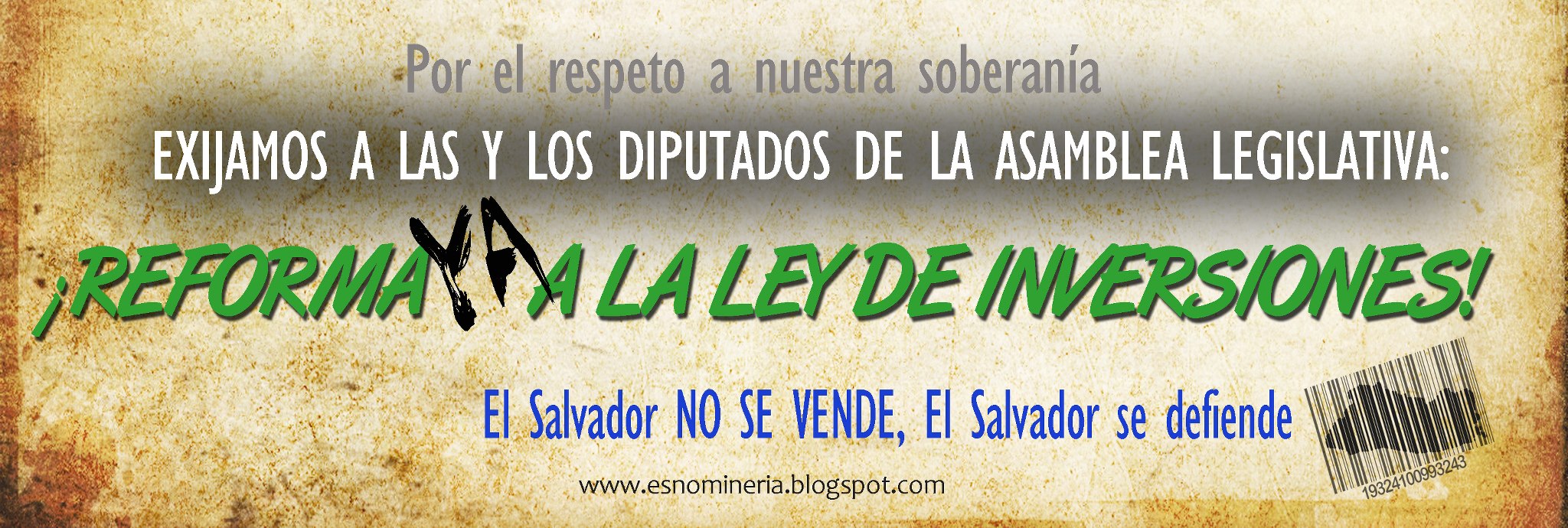
Below is an editorial aired on the ARPAS Radio Network that calls for support for the Mesa.
A Question of Sovereignty
By, the ARPAS Editorial Team
Yesterday, the National Roundtable against Metallic Mining asked the Legislative Assembly to reform the Investment Law, a piece of legislation that allows transnational corporations to sue the government in international tribunals and bypass the domestic justice system.
Article 15 of this law establishes that when controversies occur between foreign investors and the government, regarding investment in El Salvador, investors can go directly to the International Centre for the Settlement of Investment Disputes (ICSID), a corporate tribunal at the World Bank with its headquarters in Washington.
This legislation has allowed mining companies like Pacific Rim and Commerce Group to sue the government in the ICSID when the government denied their operating permits. Pacific Rim dried up wells and created violence in Cabañas, which lead to their exploitation permits being denied; and Commerce Group’s exploitation license was revoked because it contaminated the San Sebastian River in La Union.
But, unsatisfied with the legitimate and fair decision taken by the Salvadoran government, both transnational corporations went to the ICSID in order to sue the country, basing their cases in the Investment Law and in the Central American Free Trade Agreement (CAFTA), the latter of which was ratified by a right-wing legislative assembly during the Antonio Saca government.
The Investment Law and free trade agreements are a key part of the neoliberal legal structure implemented by ARENA governments that favor national and foreign big businesses at the cost of the public interest in the country. For this reason, the first steps of building a new economic model in which prioritizes national interests, would take this damaging neoliberal legal framework apart.
This why the efforts of the National Roundtable against Mining are so important: we need to reform or overturn the Investment Law and CAFTA in order to replace them with laws and trade agreements that promote investment and trade, but without infringing on the sovereignty and self-determination of the country, the protection of the environment and the rights of the population. Therefore, all the patriots and everyone who feels tied to this country should support the Mesa’s motion and demand that the Legislative Assembly revise and modify all the investment legislation and trade passed during the ARENA governments and that supports the neoliberal model that we need to change.
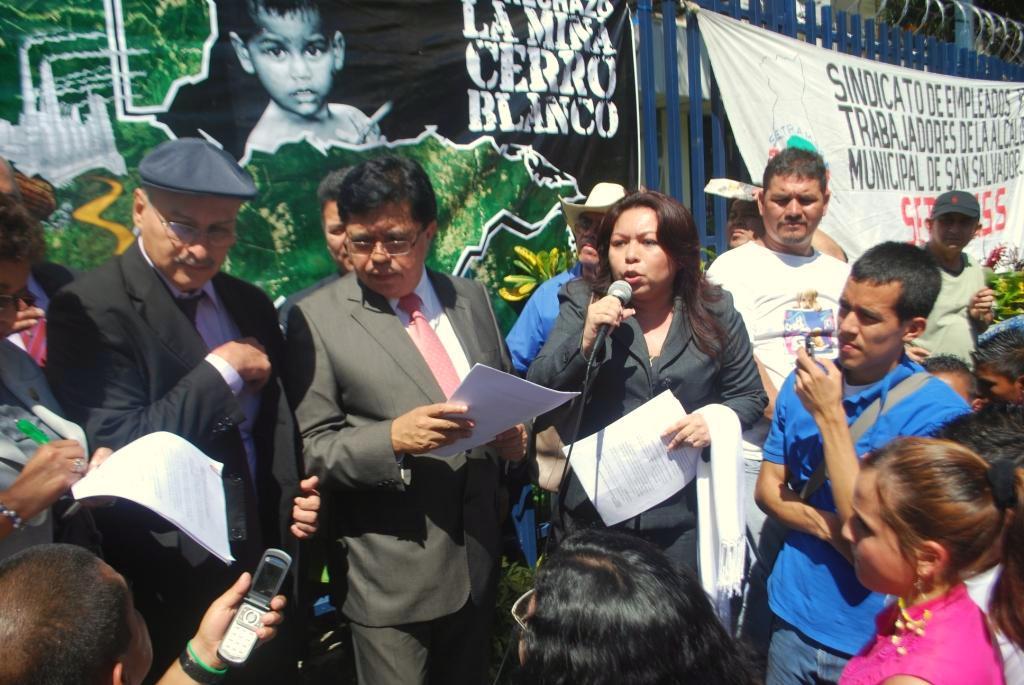
 However, now, that legislation is under attack by WI Governor Scott Walker, supported by mining company representatives. Environmental, Indian, and community organizations from across the state are organizing and fighting back to keep the regulations that have protect their water and cultural identity.
However, now, that legislation is under attack by WI Governor Scott Walker, supported by mining company representatives. Environmental, Indian, and community organizations from across the state are organizing and fighting back to keep the regulations that have protect their water and cultural identity. 

 Shandur is President of the National Federation of Indigenous Peoples of El Salvador, which works to resuscitate the vitality of indigenous cultures in a part of Central America where they have been systematically and brutally suppressed. The challenge is significant:
Shandur is President of the National Federation of Indigenous Peoples of El Salvador, which works to resuscitate the vitality of indigenous cultures in a part of Central America where they have been systematically and brutally suppressed. The challenge is significant:




